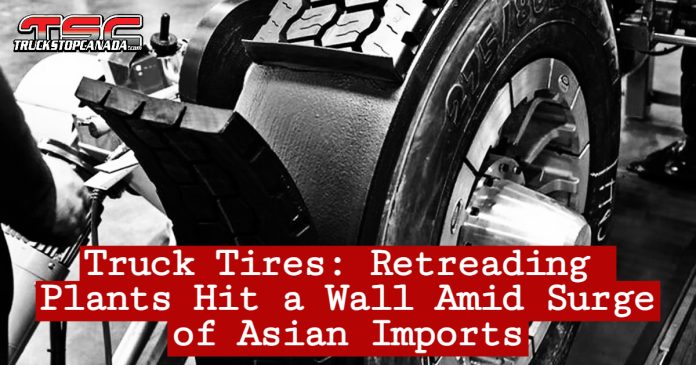Quebec’s retreading industry, which plays a key role in extending the lifespan of truck tires, is facing a major crisis. Flooded by low-cost tire imports from Asia—particularly from China and Southeast Asia—local retreading companies are sounding the alarm.
These imported tires, often of lower quality, are increasingly unsuitable for retreading. This undercuts a business model built on durability and reuse, and threatens the economic viability of a process once seen as both practical and environmentally responsible.
Retreading involves replacing the worn tread of a tire while keeping its original casing. With high-quality new tires, this process can be done up to three times. But the influx of budget tires on the market—many of which can only be retreaded once or not at all—means fewer usable casings are available. As a result, production slows down, orders drop, and companies lose revenue.
Facilities in places like Beauceville and Saint-Jérôme report a 25% to 30% drop in output. Imported tires often have higher defect rates, and more of them are rejected on inspection. This forces plants to operate at reduced capacity, which leads to fewer hours for workers and increased strain on the entire sector.
The situation also raises environmental concerns. According to retreaders, retreading a standard 11R22.5 truck tire can save around 57 litres of oil, 32 kg of rubber, and cut CO₂ emissions by 110 kg compared to manufacturing a new one. But as more non-retreadable tires enter the market, this circular model becomes harder to sustain.
Industry stakeholders are calling for action. Some propose a surtax on low-end tire imports, similar to what’s in place in the United States—where retread plants are reportedly operating at full capacity. Others advocate for financial incentives like those offered in Ontario, where $12 is reimbursed per used casing retreaded.
Without support, Quebec could lose a local industry that, according to its players, supports job creation, waste reduction, and a more circular economy. But gaining widespread buy-in remains a challenge. Many in the trucking world remain skeptical, especially when it comes to safety concerns related to retreaded tires. In the end, choosing high-quality, durable tires—whether new or retreadable—may offer long-term value, but convincing the broader transport sector is another matter.
Read More :
The Trucking Profession: Debunking the Public’s Misconceptions
















